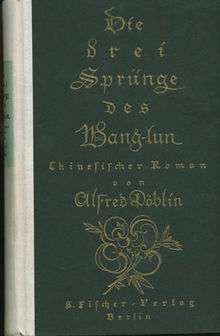The Three Leaps of Wang Lun
The Three Leaps of Wang Lun (Die drei Sprünge des Wang-lun) is a historical novel by German author Alfred Döblin that narrates upheaval and revolution in 18th-century China. Published in 1916 (although back-dated to 1915), this epic historical novel was Döblin's third novel (although it was the first to be published as a book). It earned him the Fontane Prize.[1] Favorably received by critics, who praised its detailed and exotic depictions of China, it was a literary breakthrough for Döblin.[2] Wang Lun also had an influence on younger German writers, including Lion Feuchtwanger, Anna Seghers, and Bertolt Brecht; for the latter, Wang Lun provided an impulse for the development of the theory of epic theatre.[3] In commercial sales, it is Döblin's most successful novel after Berlin Alexanderplatz.[4] The title of the novel refers to the rebel leader Wang Lun.
 Cover of the first edition | |
| Author | Alfred Döblin |
|---|---|
| Original title | Die drei Sprünge des Wang-lun |
| Translator | C.D. Godwin |
| Country | Germany |
| Language | German |
| Genre | Historical novel |
| Publisher | S. Fischer |
Publication date | 1915/1916 |
| Media type | Print (Hardcover and paperback) |
Notes
- Sander 2001, pp. 29, 133
- Sander 2001, p. 137; Schoeller 2011, pp. 159–160
- Schoeller 2011, p. 160
- Schoeller 2011, p. 159
References
- Sander, Gabriele (2001). Alfred Döblin (in German). Stuttgart: Reclam. ISBN 3-15-017632-8.CS1 maint: ref=harv (link)
- Schoeller, Wilfried F. (2011). Alfred Döblin: Eine Biographie (in German). Munich: Carl Hanser. ISBN 3-446-23769-0.CS1 maint: ref=harv (link)